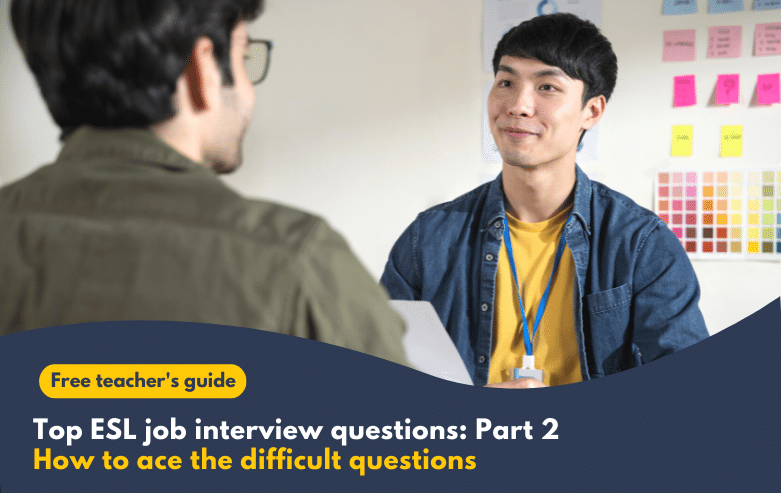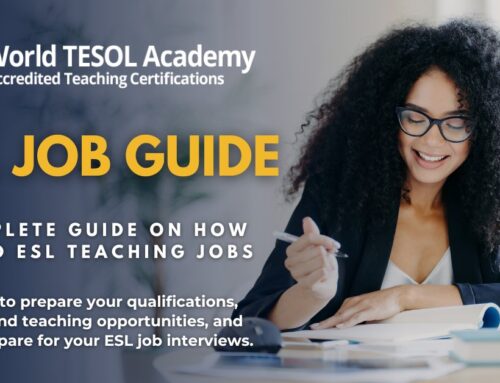
Top ESL Job Interview Questions: Part 2 of 2
In addition to the standard base questions that you’ll face during your job interview, employers may also ask a bit more hard-hitting questions that require you to show off all of the hard-earned skills you’ve developed during your teacher training.
Now in part 2 of our Top ESL job interview questions guide, we’ll continue to take a look at some of the more difficult types of questions that you are likely to encounter during your job interview.
In this part we’ll go over:
- Personality questions
- Teaching-related questions
- The “tough” questions
- Follow-up questions
Knowing how to answer these well can be the deciding factor for whether or not you’ll receive the job. Let’s dive in and explore how you can answer these questions in a professional manner that will show off the best possible version of you.
In case you missed it, don’t forget to read part 1 of our Top ESL job interview questions guide. Here we’ll cover the base questions that you’ll face during your job interview and how to professionally answer them.

1. Personality questions
💬 Q: What would you say are your strengths and weaknesses?
The key thing here is to keep the strengths relevant to the position you are applying for. A good start would be to first look at the job posting to see if they mention any key traits that they are looking for in their teachers. If they do, great, try to incorporate these into your answers and think of examples where you’ve previously been able to showcase them.
For weaknesses, you should always try to pick examples of things that you can work on or even turn into a strength. Whatever you do, don’t make the mistake of listing things that are in stark contrast to what they are seeking.
Example: If they are looking for someone that is organised and timely, then you should try to pick experiences that displayed this. Never mention that you are disorganised or a procrastinator.
💬 Q: What qualities do you think a good English teacher should possess?
ESL recruiters generally look for teachers that are organised, reliable and good at connecting with people. To know more about what the recruiter is looking for specifically, you should first look for clues in the job ad. If you are able to identify what qualities they want in their teachers, it will be easier for you to prepare a good answer that matches what they are looking for.
💬 Q: What kind of teacher are you?
Connecting this to the question above is a good way to ensure that your answer falls in line with what they are searching for in a teacher. If you are able to provide examples of times when you’ve displayed the qualities that they are looking for, you have a better chance of making a great impression.
Example:
- If they are looking for teachers that are organised, you can use examples of when you’ve helped organise events at previous schools you’ve taught at.
- If they looking for a team player, you can bring out examples of times when you’ve worked with other teachers.
- If they want teachers that are punctual and reliable, you bring up previously documented attendance records.
- If they want ambitious teachers, you can mention pursuing additional teaching certification via specialist courses such as TEYL, TEOL, and TEAL courses.
- If you lack previous teaching experience, you can instead try to find examples of when you’ve been organised in other settings. E.g. if you’ve organised events for multiple people, non-profit work where you’ve worked with people, etc.
Whichever example you choose, just make sure that it clearly displays the trait you wish to showcase and how it can translate well into a classroom setting.
💬 Q: How do you maintain your professional development?
This is a question meant to check your level of ambition and how serious you are about teaching. Not all teachers are committed to a lifetime of teaching. Some do it as means to travel the world, some do it as a temporary job, and some are fully invested in their teaching career. Whatever your reason is, it’s still a good idea to convince the employer that you will be taking the job seriously.
Things to mention can be:
- Pursuing additional specialist teaching certification,
- Attending workshops
- Reading regularly
- Personal development of soft and hard skills
There are many ways to show the recruiter that you are serious when it comes to your teaching career. Just make that you are honest and don’t lie. Spinning a web of lies is very likely to come back to bite you. So do yourself a favour and keep it simple and honest.
Getting your TESOL/TEFL certificate: Launch a new career as a certified English teacher.
Learn how to teach English overseas & online with our dual-accredited 120-hour TESOL/TEFL course. The course is 100% self-paced and online-based which means that you can decide when and where to study.
If you haven’t enrolled in the course you can do so here:
.

2. Teaching questions
As you’ve by now most likely obtained your English teaching certification, it’s finally time to show off those hard-earned skills. As a certified English teacher, you should be equipped to handle any teaching-related questions that might get thrown your way during the interview.
The best way to prepare for these questions is to remember your training! If you feel a bit rusty in some areas, it can be a good idea to go over the course material a few more times, as this can help you craft good and professional-sounding answers.
💬 Q: Have you taught students of different nationalities before?
The employer may ask this in order to know how well you are able to adapt to new cultures and settings. If you don’t have any experience teaching foreign students, it can be a good idea to frame your answer in a way that displays your curiosity and interest in other cultures and your enthusiasm to learn and grow. This way you will be able to show the employer your drive and that you’ll make an effort to adapt.
💬 Q: How would you establish rapport with your students?
Rapport building is extremely important when working as an English teacher. Knowing how to build a good relationship with your students will help solidify your credibility in the classroom. It will also make your students more comfortable in the classroom which can enable them to have a better learning experience.
When preparing an answer for this question, you should try to weave in what you’ve learnt in your teacher training courses with examples of where you successfully built good relationships with students.
If you do not yet have teaching experience, try to instead focus on times when you successfully managed to build rapport with a person you were helping. If you’ve ever volunteered, you can use that as an example of how you managed to build rapport.
The main thing to focus on is that the recruiter is able to clearly see that you are great at building rapport with people.
This can be things such as:
- Learning their names.
- Learning what they are interested in.
- Connecting the course material to their interests.
💬 Q: How do you handle difficult students?
Everyone has bad days every now and then which can affect the way we behave around other people. As much as one would like to be able to avoid dealing with difficult students, it’s a core task that you are going to have to face sooner or later when working as a teacher.
It’s not uncommon for the employer to want to know if you are able to keep your cool during conflicts and how you would handle an unruly student during a lesson.
Improper handling of difficult students often negatively affects the rest of the class, which may affect the reputation of the school. Therefore, it’s very likely that the employer will ask you this question.
If they do, it can be a good idea to mention that you find working proactively instead of reactively to be a good way of catching bad behaviour before it manifests. Rather than focusing on punishment and strict discipline, you find that focusing on support, engagement, and understanding of the student that is causing trouble often produces better results when it comes to managing bad behaviour.
People aren’t born bad, rather they are a product of their environment. If you are able to get a better understanding of what may be triggering the bad behaviour, you’ll likely be better equipped to manage it before it happens.
💬 Q: How do you keep your students engaged and motivated during your lessons?
This is a likely follow-up question to the previous one. Being able to engage and motivate your students is key if you want them to perform at their best. If you fail to provide a stimulating and engaging learning environment, it will often result in reduced performance and motivation.
Try to give the recruiter some examples of techniques and activities that you’ve learnt in your teacher training courses, as well as times when you’ve successfully used them in the classroom.
If you are planning on teaching online, it’s even more important that you have ready-to-use techniques and activities that can help keep the students engaged throughout your lessons.
💬 Q: How would you check if your students understand the lesson content?
This is a part of the teaching process that you should be well familiar with if you are a certified English teacher.
When working as a teacher, it is very important that you know if your students are keeping up with the lessons. If you fail to spot this, it may result in the student falling behind which will affect both the student and the overall speed of the rest of the class. Also, both students and parents will want to see progress so that they know that they are getting value for their money.
Here it can be a good idea to provide some examples of techniques and activities that you would use to check their understanding, such as activities that use CCQ and ICQ questions.
💬 Q: How do you lesson plan?
It’s not uncommon for employers to have pre-made lesson plans that you only need to implement and follow when teaching. In cases like this, give some examples of previous lesson plans that you’ve used, but also let them know that you are always open to adapting to any material that they use.
If you are expected to create lesson plans for the employer, spend some extra time researching and preparing some more detailed examples of how you would plan a lesson. This way you’ll be able to convince the employer that you have the necessary skills needed. When providing examples, always make sure that you include the purpose of your selection. Otherwise, your examples might sound hollow and without substance.
💬 Q: What is your view on having an English-only teaching environment in the classroom?
Most ESL employers have an English-only policy for their classrooms. This means that you are expected to only use English to communicate with and teach your students. There can be exceptions, such as providing instructions, translation exercises, answering detailed questions, etc. However, most of the time you will be expected to only use the target language when teaching.
Take a look at the employer’s website before the interview and see if you are able to find any clues about their classroom policies. If you are unable to find any information about it, let the employer know that you are open and willing to adapt to their policies.

3. The tough questions
As much as we would like for the interview to follow a fixed process with a specific set of questions, the reality is that an interview can look very different depending on who is conducting it.
Fortunately, the questions mentioned above are some of the most common ones that you are likely to encounter during an interview. If you prepare well for these, then you will have covered a major part of the interview. However, it’s also worth keeping in mind that recruiters sometimes steer off the main path and ask some tougher questions.
💬 Q: Could you tell me some more about this gap in your resume?
A lot of us have some parts on our resumes that may raise some additional questions. A classic one is if there is a gap on your resume. People are faced with all kinds of difficulties in their lives, this has been especially true during the last couple of years with the Covid-19 pandemic.
As much as we would like to claim that having a gap is not that big of a deal and that no questions will be raised about it, the fact is that some employers may want to know why there is a gap. The presence of a gap on a resume can weigh differently depending on the local culture, so it can be good to prepare a well-thought-out answer in case the question comes up.
If you have a gap on your resume, you are recommended to stay as close to the truth as possible while keeping it professional and brief.
Example:
- If you were struggling to find work, try to instead focus on the effort that you put in while looking for work and that you are eager to get started. The pandemic hit many people hard, so having an employment gap due to this is not as uncommon as one would think.
- If you took time off to help take care of family, try to focus on the things that you did during that time to keep your skillset fresh and ready for when you were ready to get back again. Most, if not all, employers will empathise with this reason.
- If you quit due to personal reasons, you can mention that you needed some time to reorganise some parts of your life, but that you are now finally back on the right path and eager to get back to work.
- If you were laid off, try to instead focus on what you learnt from that work experience and then mention that you are eager to apply this knowledge at your next job.
After you’ve briefly explained the reason for the gap, you can try to steer the conversation back to the job by asking a question about something that you wish to know more about. If the employer is satisfied with your answer, they follow the lead and continue on with the interview.
If they keep pushing and you feel that it is becoming too much, you can politely say that you prefer to not go into more detail on the matter, but that you are more than happy to answer anything else they wish to know regarding your work experience. It’s rare that it reaches this stage, but if it does, then you’ll have a brief but polite answer ready.
4. Follow-up questions
Other tough questions that may come up during the interview are often follow-up questions to the standard ones mentioned above. You may be asked to elaborate a bit more and provide examples to back things up. However, as you’ve already done your homework and prepared well with proper examples that back your answers up, you should be well-equipped to handle any follow-up questions that may get thrown your way.
Together with part 1 of this “Top ESL job interview questions” guide, you’ll be well-equipped to prepare thought-through and professional answers that will allow you to maximise your chances of making the best possible impression and nailing your job interview.




I love the way your articles explain things.
Very informative and clear. Thank you so much.